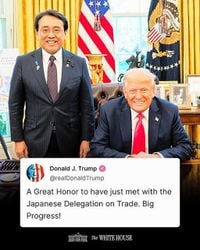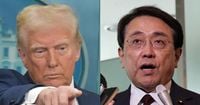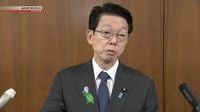Japan and the United States have embarked on crucial trade negotiations, with both sides aiming to clarify their positions and work towards a mutually beneficial agreement. The discussions come in the wake of the Trump administration's implementation of high tariffs on automobiles and other products, as well as reciprocal tariffs that have raised tensions between the two nations.
On April 18, 2025, Japan's economic revitalization minister, Ryosei Akazawa, attended the first round of negotiations in Washington, D.C. This meeting was particularly significant as it marked the beginning of a dialogue aimed at resolving trade disparities. Notably, U.S. President Donald Trump attended the meeting personally, which underscored the importance he places on these discussions.
During a 50-minute meeting with Trump, Akazawa emphasized Japan's position on tariffs, particularly in the automotive sector. Following this initial conversation, Akazawa engaged in further talks with U.S. Treasury Secretary Scott Bessent and other officials for an additional 75 minutes. The outcome of these discussions was optimistic, with both parties expressing a desire to reach an agreement soon. Akazawa reported that Trump had indicated that negotiations with Japan were a top priority, a sentiment echoed in a social media post where Trump proclaimed, "Big Progress!"
However, the negotiations are not without their challenges. The U.S. has been pushing for tariff reductions on agricultural and other products, while Japan has been cautious about making further concessions. Under the Japan-U.S. trade agreement that took effect in 2020, Japan has already reduced tariffs on agricultural goods to levels comparable to those under the Trans-Pacific Partnership (TPP). Given this context, it is difficult for Japan to justify additional reductions.
One area where Japan is particularly sensitive is in the automotive sector. The Trump administration recently imposed an additional 25 percent tariff on imports, further complicating the discussions. Trade Minister Muto Yoji has acknowledged that Japan only imports around 10,000 U.S.-made automobiles, a stark contrast to the vast number of vehicles Japan exports to the U.S. He stated, "It is a fact that Japan only imports around 10,000 US-made automobiles, far less than what Japan exports to the US. Japan needs to consider what it can do to address the issue."
The U.S. Trade Representative's office has criticized Japan for what it describes as non-tariff barriers that hinder access to its automotive market. A report published last month highlighted differences in vehicle safety regulations and the Japanese government's handling of charging standards for electric vehicles as key issues. These alleged barriers are expected to be a focal point in future rounds of negotiations.
In addition to trade discussions, security issues were also on the agenda. Trump reportedly expressed concerns about the fairness of the U.S. being solely responsible for Japan's defense under the Japan-U.S. Security Treaty. Japan currently hosts U.S. military bases and bears a larger financial burden for stationing American troops than many of its allies. In recent years, Japan has invested heavily in defense, purchasing advanced military equipment from the U.S. at an annual cost of approximately ¥1 trillion.
As Japan navigates these negotiations, it is crucial for the government to effectively communicate its contributions to defense spending and to strengthen its own defense capabilities. Moreover, to bolster its negotiating power, Japan may need to cultivate alliances with like-minded countries that support free trade principles, including TPP member nations and the European Union.
The upcoming rounds of negotiations will undoubtedly be pivotal in shaping the future of Japan-U.S. trade relations. With both nations eager to find common ground, the focus will remain on addressing key issues such as tariffs, non-tariff barriers, and security obligations. As these discussions unfold, the international community will be watching closely, aware that the outcomes will have significant implications not only for Japan and the U.S. but also for global trade dynamics.
In conclusion, the Japan-U.S. trade negotiations signify a critical moment for both nations as they seek to balance their economic interests and security commitments. With the stakes high, the path forward will require careful diplomacy and a willingness to compromise on both sides. As the world evolves, so too must the frameworks that govern international trade, and these negotiations represent an essential step in that direction.







